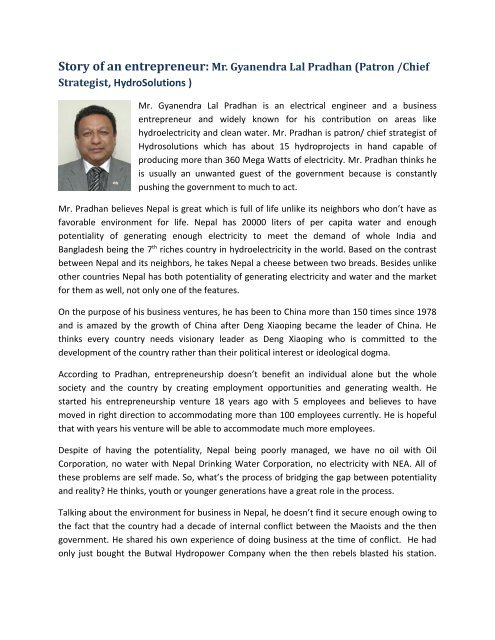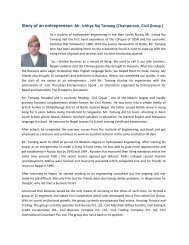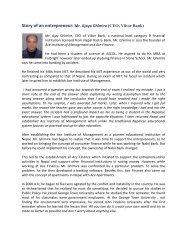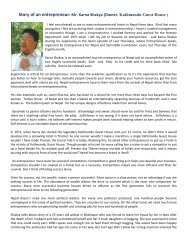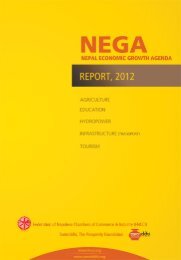Mr. Gyanendra Lal Pradhan - Samriddhi, The Prosperity Foundation
Mr. Gyanendra Lal Pradhan - Samriddhi, The Prosperity Foundation
Mr. Gyanendra Lal Pradhan - Samriddhi, The Prosperity Foundation
You also want an ePaper? Increase the reach of your titles
YUMPU automatically turns print PDFs into web optimized ePapers that Google loves.
Story of an entrepreneur: <strong>Mr</strong>. <strong>Gyanendra</strong> <strong>Lal</strong> <strong>Pradhan</strong> (Patron /Chief<br />
Strategist, HydroSolutions )<br />
<strong>Mr</strong>. <strong>Gyanendra</strong> <strong>Lal</strong> <strong>Pradhan</strong> is an electrical engineer and a business<br />
entrepreneur and widely known for his contribution on areas like<br />
hydroelectricity and clean water. <strong>Mr</strong>. <strong>Pradhan</strong> is patron/ chief strategist of<br />
Hydrosolutions which has about 15 hydroprojects in hand capable of<br />
producing more than 360 Mega Watts of electricity. <strong>Mr</strong>. <strong>Pradhan</strong> thinks he<br />
is usually an unwanted guest of the government because is constantly<br />
pushing the government to much to act.<br />
<strong>Mr</strong>. <strong>Pradhan</strong> believes Nepal is great which is full of life unlike its neighbors who don’t have as<br />
favorable environment for life. Nepal has 20000 liters of per capita water and enough<br />
potentiality of generating enough electricity to meet the demand of whole India and<br />
Bangladesh being the 7 th riches country in hydroelectricity in the world. Based on the contrast<br />
between Nepal and its neighbors, he takes Nepal a cheese between two breads. Besides unlike<br />
other countries Nepal has both potentiality of generating electricity and water and the market<br />
for them as well, not only one of the features.<br />
On the purpose of his business ventures, he has been to China more than 150 times since 1978<br />
and is amazed by the growth of China after Deng Xiaoping became the leader of China. He<br />
thinks every country needs visionary leader as Deng Xiaoping who is committed to the<br />
development of the country rather than their political interest or ideological dogma.<br />
According to <strong>Pradhan</strong>, entrepreneurship doesn’t benefit an individual alone but the whole<br />
society and the country by creating employment opportunities and generating wealth. He<br />
started his entrepreneurship venture 18 years ago with 5 employees and believes to have<br />
moved in right direction to accommodating more than 100 employees currently. He is hopeful<br />
that with years his venture will be able to accommodate much more employees.<br />
Despite of having the potentiality, Nepal being poorly managed, we have no oil with Oil<br />
Corporation, no water with Nepal Drinking Water Corporation, no electricity with NEA. All of<br />
these problems are self made. So, what’s the process of bridging the gap between potentiality<br />
and reality? He thinks, youth or younger generations have a great role in the process.<br />
Talking about the environment for business in Nepal, he doesn’t find it secure enough owing to<br />
the fact that the country had a decade of internal conflict between the Maoists and the then<br />
government. He shared his own experience of doing business at the time of conflict. He had<br />
only just bought the Butwal Hydropower Company when the then rebels blasted his station.
Extreme depression made him giving a serious thought of moving to Canada to settle there but<br />
abandoned the thought later.<br />
Later, he went to Pyuthan to interact with the Maoists. He wanted to know the rebels<br />
destroyed hydropower stations and Nepal Telecom Towers which primarily benefited the poor<br />
not the so called feudal they were struggling against. He also requested them not to destroy the<br />
Jhimruk Hydropower promising them that he won’t bring the army to the project site for<br />
security for which he had to face considerable pressure from the government. He resolved the<br />
issue with the Norwegian help. He thinks the events might be one of the reasons Maoist-led<br />
government is concerned about the generation of hydropower. He went to meet <strong>Mr</strong>. Kansakar,<br />
the then managing director of Nepal Telecom but couldn’t convince him to take similar<br />
approach towards solving the issues. He thinks the rebels had been mistakenly destroying the<br />
infrastructures and clear communication would have generated understanding and thereby<br />
creating conducive environment for infrastructures even at the time of conflict.<br />
As an advice to young entrepreneurs, he suggests them to take some calculated risks and do<br />
something new rather than copying from someone because copying from someone always<br />
makes one inferior to the original entrepreneur. Risks should be reasonable though.<br />
Organizing capacity is another very important skill needed by an entrepreneur because he<br />
believes even the most capable entrepreneurs cannot exceed certain level without<br />
organization. Organizing skills involve networking and connecting with people who are crucial<br />
to the success of the organization. According to him, partnership is better form of business<br />
ventures and competition between partners promotes the interest of the organization rather<br />
than sole trading concern where the sole owner enjoys monopoly.<br />
Giving the participants a glimpse of his childhood and his growing environment he explained<br />
how he grew up into an entrepreneur. <strong>Mr</strong>. <strong>Pradhan</strong> grew up in Bandipur where he went to the<br />
local government school using slates as copies. He related his own experience to let the<br />
younger generation realize that they are much privileged as compared to his generation. He<br />
first saw his copy at class 4 and his first car at class 6.<br />
A person from his village who returned from Switzerland talking about ropeways and electricity<br />
instilled on him the interest towards electricity which later developed into passion as he began<br />
using his pocket money to buy lights and torches.<br />
<strong>Mr</strong>. <strong>Pradhan</strong> then emphasized on the importance of hydroelectricity in Nepal. Hydropower is<br />
the cheapest form of energy and the most convenient as well. Electricity is more than 70<br />
percent efficient which is very high as compared to other forms of energy. Nepal saw the dawn<br />
of electricity with the 500KW Pharping Hydroelectricity Project in 1911 AD. But lights were<br />
consumed by the the then rulers only and there wasn’t any for the general public. People used
to call the lights the “Chandra batti” and <strong>Mr</strong> <strong>Pradhan</strong> calls the current electricity “Prachanda<br />
batti” owing to the unchanged condition of the Nepali general public. But water is to Nepal as<br />
oil is to the Arabian countries. He suggests everyone to learn from Norway who is the fifth<br />
largest producer of oil uses electricity for its domestic use and exports all oil. Norway stated<br />
electricity projects when it was too poor by calling on foreign investment and safeguarding the<br />
investments. <strong>The</strong> abundant production of cheap electricity caused foreign aluminum companies<br />
to come to Norway and soon Norway was a large producer of aluminum as well and then due<br />
to the arising demands many foreign companies came to Norway to create a huge shipping<br />
industry which was followed by Petroleum seekers. Similarly Nepal can be as prosperous as<br />
Norway if it utilizes its water resources. Nepal not only ha potentiality to generate electricity, it<br />
has also been fulfilling more than 70 % of India’s fresh water demand.<br />
<strong>Mr</strong>. <strong>Pradhan</strong> outlines the primary characteristics of successful entrepreneurs as follows:<br />
1. One need to think differently…To be different<br />
2. Be a day dreamers<br />
3. Independent, tough and creative<br />
4. Extremely optimistic<br />
5. Be prompt decision makers if they have enough facts/ information<br />
6. Have a vision to drive enterprise<br />
7. Have a habit of analyzing their past actions and learning from them and planning future<br />
steps<br />
8. Have determination and strategies to turn the vision into reality<br />
<strong>Mr</strong>. <strong>Pradhan</strong> earned his first salary of Rs. 374 as engineer in 2035 and worked as engineer with<br />
a state-owned transformer producing company. As an employee he was sad to see his<br />
colleagues harassing and delaying the jobs of general public in order to extract bribes. He later<br />
started his own cable company in 1992 with a capital of 0.5 million which he has developed into<br />
the second largest cable company of the country.<br />
His ventures have been awarded with the “Blue Planet Awards “(2005) and other various<br />
awards.
<strong>Mr</strong>. <strong>Pradhan</strong> started Hydro Solutions in 2007 which has projects producing more than 3000<br />
Megawatts in hand in present. He shares a deep bond with his employees to whom he<br />
sometimes cooks various dishes.<br />
Like every entrepreneur, <strong>Mr</strong>. <strong>Pradhan</strong> has a very busy schedule which consists of meetings,<br />
report reviews, political advocacy for the development of hydropower and promotion of his<br />
companies. Nonetheless, he sets aside a day each for social involvements and his family every<br />
week.<br />
Concluding his speech, <strong>Mr</strong>. <strong>Pradhan</strong> said more than 50 thousand crore rupees is currently being<br />
invested in hydropower now. It is the most significant time in the history of hydroelectricity in<br />
Nepal. <strong>The</strong> fate of the current investments will determine the future of hydroelectricity in<br />
Nepal. He warned that if the current investments returned or failed due to the reasons as<br />
before, it would be better to forget about hydroelectricity in Nepal forever.<br />
Question and Answers<br />
1. What’s the biggest obstacle to making something happen? We hear about corruption,<br />
inefficiency?<br />
This country is great, we have enough enormous resources but they are very poorly<br />
managed and there is a lack of visionary leaders. Nepal has a very high rate of political<br />
understanding but most of the people don’t understand economics and the virtue of<br />
entrepreneurship.<br />
Business people are bit self-centered. <strong>The</strong>y need to persuade leaders to do something<br />
for the country instead of thinking about profits only. Our leaders aren’t bad. When<br />
needed, they have struggled and sacrificed for the country, but as they have their own<br />
agenda and we can persuade them to do something for the country at least. We need to<br />
pressurize the leaders by organizing and stop talking too negatively about this country.<br />
Even countries like Bhutan, Vietnam, and Cambodia have changed. So can us.<br />
2. What are the major hindrances to goal of producing the 10000 Mega watt of electricity?<br />
NRB says our commercial banks don’t have enough capital? Who will fund the projects?<br />
We have 550 billion rupees in our market. Around 2000 Mega watt can be produced<br />
with this much capital for the rest foreign investments should be attracted. And people<br />
needn’t worry about the foreign investment as once invested in hydro projects they<br />
become local investments as it not possible to shift all the infrastructure of hydro<br />
electricity. We need to make the environment investment friendly though.
3. Can’t the remittance be a good source of capital for investment in hydropower?<br />
It can be. People should be provided with proper incentives to invest their money on<br />
hydroelectricity rather than the areas they are investing now.<br />
4. How to manage the people affected by construction of hydro projects and how to<br />
overcome objections of locals in constructing hydro electricity projects?<br />
Affected is wrong word to use. Construction of hydropower projects always improves<br />
the life standard of local people by providing them with electricity, roads and better<br />
lands...so better say promotion. Usually high, unreasonable expectations of local people<br />
make them interrupt projects. We need to make them aware of the limitations of the<br />
project but fulfill all the promises you make to the. Making locals happy is more<br />
important than reducing cost.<br />
5. Which projects are on the pipeline?<br />
Projects capable of producing more than 3000 Mega Watts of electricity and<br />
investments of more than 50 thousand crore have already started. It’s our last chance of<br />
producing the electricity and if we fail now , we better forget about producing hydro<br />
power in this country.<br />
<strong>The</strong>se projects are will not only help in producing electricity but also help to create a<br />
peaceful country by engaging every people in construction works, and generating<br />
employment and income for all like that of Sikkim 20 years ago.<br />
Final tip: It’s very easy to be happy. Just learn to separate chinta and chintan. Worry and<br />
do your best to change the things you can change and learn not to worry about the<br />
things you cannot change!<br />
Around 35 people from various backgrounds including entrepreneurs related to tourism<br />
sector, travel agencies and students had participated in the event.<br />
By Surath Giri
Program Assistant<br />
<strong>Samriddhi</strong>, <strong>The</strong> <strong>Prosperity</strong> <strong>Foundation</strong><br />
For more stories visit: http://www.samriddhi.org/page.php?id=12


